Commercialization Fellowship Seeks Product Market Fit
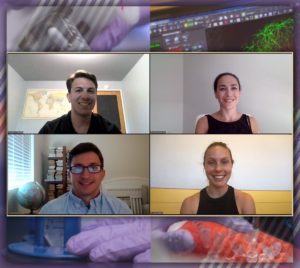 This summer marked a new kind of journey into the possibilities of technology for four University of Washington graduate students. Each were matched with an innovative project (detailed below) as part of the ITHS/WRF Summer Commercialization Fellowship Program hosted by the Foster School’s Buerk Center for Entrepreneurship. Their goal is to deliver solid business and market assessments on the commercial potential of these projects, which happened to all come from research labs at UW this year.
This summer marked a new kind of journey into the possibilities of technology for four University of Washington graduate students. Each were matched with an innovative project (detailed below) as part of the ITHS/WRF Summer Commercialization Fellowship Program hosted by the Foster School’s Buerk Center for Entrepreneurship. Their goal is to deliver solid business and market assessments on the commercial potential of these projects, which happened to all come from research labs at UW this year.
“These students will use the skills they’ve cultivated in the classroom and through their professional work to try to answer some really hard questions,” said Buerk Center assistant director and Hollomon Health Innovation Challenge manager Jessica Roberto. “Together, they will uncover more about the immediate future for these high-impact projects that one day could change lives for the better.”
The students were selected after a competitive application process and began earning a stipend for a minimum of 30 hours a week on the projects in late June. The 10-week fellowship will wrap up in late August. Support from the Institute of Translational Health Sciences (ITHS) and the Washington Research Foundation, and a partnership with UW CoMotion, make the annual fellowship program possible.
2021 FELLOWSHIP PROJECT – EPICELL THERAPEUTICS EPIGENETIC PLATFORM
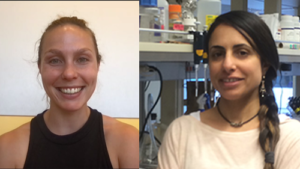 To the average person, cell-based therapies are as complicated as they sound. However, there’s no doubt this therapeutic approach could one day treat or eliminate a wide range of diseases and disorders. The trick with such therapies is to safely and accurate tell stem cells, immune cells, etc. how to become different, more specialized types of cells with a specific function (like to kill a cancerous growth). PhD student Louisa Helms paired with Shiri Levy to work on the potential applications for an innovative computationally designed protein inhibitor being developed out of the Department of Biochemistry and the UW Institute for Protein Design. This technology has no direct competitors. So, for Helms it will be a huge opportunity to explore which markets will make the best use of it and what strategy is most likely to bring a product to fruition.
To the average person, cell-based therapies are as complicated as they sound. However, there’s no doubt this therapeutic approach could one day treat or eliminate a wide range of diseases and disorders. The trick with such therapies is to safely and accurate tell stem cells, immune cells, etc. how to become different, more specialized types of cells with a specific function (like to kill a cancerous growth). PhD student Louisa Helms paired with Shiri Levy to work on the potential applications for an innovative computationally designed protein inhibitor being developed out of the Department of Biochemistry and the UW Institute for Protein Design. This technology has no direct competitors. So, for Helms it will be a huge opportunity to explore which markets will make the best use of it and what strategy is most likely to bring a product to fruition.
“I want to really become comfortable and fluent with talking and exploring the customer discovery interface that is vital to business development,” said Helms. “As a PhD student we learn how to do the science, but I really need to grow my business skills and experience as well.”
Helms brings previous experience to the fellowship that is a bit unique for the program. Last summer she worked in the same lab where past fellow Nicole Zeinstra was paired with Benjamin “Beno” Freedman on his project (More on that below). That experience attracted Louisa to the program along with a desire to carve out her post-doctorate path.
“I really like entrepreneurship and I hope to work in business development at a startup or an established biotech down the road,” said Helms. “To work on translational science not just at the bench is a good career move for me.”
Outside of the fellowship, Louisa’s summer plans included adding Mt. Hood to the list of mountains she has climbed.
2021 FELLOWSHIP PROJECT – SMARTPHONE-BASED RISK ASSESSMENT TOOL FOR STROKES
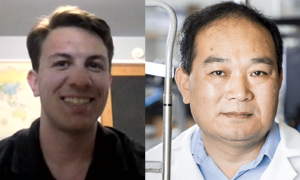 Imagine helping up to 100,000 older adults predict their stroke risk while also saving over $3 billion in healthcare costs. That’s the lofty, but potentially reachable goal for a developing innovation coming out of the UW Department of Bioengineering. Luke Thurber (Masters of Applied Bioengineering ’21) paired with Ruikang (Ricky) Wang, professor of Bioengineering and Ophthalmology, on an innovative low-cost, easy-to-use smartphone-based screening tool that looks at parts of the body in a really unique way.
Imagine helping up to 100,000 older adults predict their stroke risk while also saving over $3 billion in healthcare costs. That’s the lofty, but potentially reachable goal for a developing innovation coming out of the UW Department of Bioengineering. Luke Thurber (Masters of Applied Bioengineering ’21) paired with Ruikang (Ricky) Wang, professor of Bioengineering and Ophthalmology, on an innovative low-cost, easy-to-use smartphone-based screening tool that looks at parts of the body in a really unique way.
“I think a lot of times in science and academia you see these very useful tools and techniques that are developed but aren’t always matched with a market that could really benefit from them,” said Thurber. “I’m excited to bring the technology aspect together with the business side.”
Thurber took his collegiate journey down this new path in part because of the Technology Entrepreneurship Certificate program offered at Foster, where he heard about the fellowship. It also gave him a way to grow business skills while completing a master’s program that built on his experience as an undergrad (also at UW) in Bioengineering. Thurber also competed in the 2021 Hollomon Health Innovation Challenge with his team Return to Life Rehab, which developed a wearable device aimed at tracking physical therapy progress and in-home compliance.
Outside of the fellowship, he likes to get outdoors and hike, ski, camp, and participate in water sports.
2021 FELLOWSHIP PROJECT – RAPID DIAGNOSTIC SENSOR FOR POINT-OF-CARE COVID-19 SCREENING
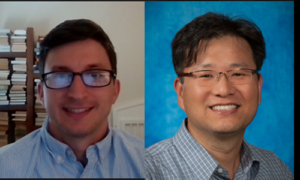 Rapid testing became one of the first methods to fight back in the COVID-19 pandemic and save lives. However, there’s still room for improvement. Juris Doctor student John Schmitz from the School of Law teamed up to help Jae-Hyun Chung from the Department of Mechanical Engineering discover whether an innovative new device can have a sustainable path for commercialization. The new technology has been validated to test at the same sensitivity levels of PCR-based tests for COVID-19, but in a fraction of the time. The question now is whether the device has long-term potential in additional testing markets.
Rapid testing became one of the first methods to fight back in the COVID-19 pandemic and save lives. However, there’s still room for improvement. Juris Doctor student John Schmitz from the School of Law teamed up to help Jae-Hyun Chung from the Department of Mechanical Engineering discover whether an innovative new device can have a sustainable path for commercialization. The new technology has been validated to test at the same sensitivity levels of PCR-based tests for COVID-19, but in a fraction of the time. The question now is whether the device has long-term potential in additional testing markets.
“I have an undergraduate degree in engineering from the University of Michigan, but I don’t have much in the way of background with medical technology,” said Schmitz. “This is a way to learn about what entrepreneurs are going through and help people who are trying to bring the cutting-edge out into the world.”
Schmitz’s goal is to work in intellectual property and patent law and feels like this will be a lasting experience. “This is the other side of intellectual property. It allows me to understand the process as companies take inventions public.”
Outside of the program, Schmitz has a young daughter and loves spending time with his family while also getting outdoors when they can.
2021 FELLOWSHIP PROJECT – REMOTE MONITORING TO MEASURE ADHERENCE TO TB THERAPY
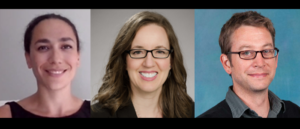 Treating tuberculosis is a long, arduous process with antibiotic regimens taking up to nine months to complete. Consequently, some patients don’t finish the treatment, even though without it there would be even more than the annual 1.5 million deaths from TB. So, a team of UW researchers have developed a digital tool and home drug metabolite test to promote and empower patients and healthcare teams in low- and middle-income countries to complete the regimen. Summer fellow Elsa Ellia (MBA ’22) is working with Sarah Irabarren from the Department of Biobehaviorial Nursing and Health Informatics as well as Barry Lutz from the Department of Bioengineering to evaluate the market potential of these innovations in the U.S. and abroad.
Treating tuberculosis is a long, arduous process with antibiotic regimens taking up to nine months to complete. Consequently, some patients don’t finish the treatment, even though without it there would be even more than the annual 1.5 million deaths from TB. So, a team of UW researchers have developed a digital tool and home drug metabolite test to promote and empower patients and healthcare teams in low- and middle-income countries to complete the regimen. Summer fellow Elsa Ellia (MBA ’22) is working with Sarah Irabarren from the Department of Biobehaviorial Nursing and Health Informatics as well as Barry Lutz from the Department of Bioengineering to evaluate the market potential of these innovations in the U.S. and abroad.
“Previously, I only worked with big, established companies, so I am excited to help a potential company at a really early-stage,” said Ellia. “I think you add another dimension when you’re working on a project linked with science and you know that you can have an impact in public health.”
Ellia’s background is in finance, but she specifically went back to school to get a Foster MBA in hopes of one day working in venture capital. Specifically, she wants to focus on innovations with a positive impact. “This will help give me a good understanding of the healthcare science industry, but also, will allow me to experience the entrepreneurs’ journey.”
This marked Ellia’s first summer in the Seattle-area and she said she made a plan to discover something new each weekend.
FELLOWSHIP ALUMS SHARE ADVICE FOR THE NEW COHORT
 The ITHS/WRF Summer Commercialization Fellowship Program has paid huge dividends for alumni. Bioengineering PhD candidate Nicole Zeinstra and Brendan Amlan (MBA ’21) both participated in the summer 2020 fellowship and say the experience was incredibly impactful.
The ITHS/WRF Summer Commercialization Fellowship Program has paid huge dividends for alumni. Bioengineering PhD candidate Nicole Zeinstra and Brendan Amlan (MBA ’21) both participated in the summer 2020 fellowship and say the experience was incredibly impactful.
“I got a lot of value in particular out of doing customer discovery and talking to people who would really use the things we’re looking into,” said Zeinstra. “So, it was really cool for me as a scientist and a future patent lawyer to learn what people are interested in and require for a good product.”
Amland echoed the value of the customer discovery experience. “You are in a real environment with real stakeholders who aren’t your professors or students,” he said. “I’ve talked with other students who went into different internship programs, and they didn’t get the same holistic experience that I got working with a new technology.”
Amland’s project was with Pierre Mourad of the Department of Neurological Surgery as well as Jason Hauptman from Seattle Children’s Hospital. It involved a non-invasive approach to clearing catheter blockages in newborns that can cause major issues, or even death. Amland says he’s heard from the team and that they are still working on the project.
Zeinstra’s work was with Benjamin ‘Beno’ Freedman in the department of Medicine, as well as other partners such as Seattle Children’s Hospital and Fred Hutch, and current fellow Louisa Helms (who was a graduate student in the lab at the time). Their project focused on developing mini-kidney structures that can be engineered to allow for the testing of treatments for a wide range of diseases. In the months after the fellowship, the project received a 5-year $4 million dollar funding grant from the National Institutes of Health. “It was definitely a very special product and project and there was a lot of interest from people, so in that regard it doesn’t surprise me that it’s received this sort of exposure. It’s really cool and very exciting.”
Both Zeinstra and Amland encourage the current fellows and future ones to really lean in on communication and listening. Amland graduated with an MBA from the Foster School this spring and is now doing supply chain work at Providence Health. He says the fellowship taught him lessons he uses every day at his job.
“It really stuck with me the importance of interviewing and reaching out to patients, customers, and other stakeholders to get their opinion, buy-in, and feedback,” he said. “I would tell all fellows to make sure you really listen to the inventors and the team and what they see as their obstacles and try to deliver that as well as the deliverables required by the fellowship.”
Zeinstra sees the experience as one that will prepare her for the next stage of her life. This fall, she plans on applying for Law School and in the spring, she will defend her PhD. “Wanting to be a patent lawyer and understanding the perspective of a scientist in getting a PhD is a valuable thing,” she said, “not just as a credential, but because you are able to speak the language. That is so valuable in terms of commercializing technology.”
The 2021 cohort will wrap up in late August. More details can be found on startup.uw.edu about this and our other fellowships. The Buerk Center also partners with the Population Health Initiative, the Evans School of Public Policy & Governance, and CoMotion on the Social Entrepreneurship Fellowship program, which launched in 2019. You can learn more about those fellows and their projects on the Population Health website or by clicking on the article link here.
